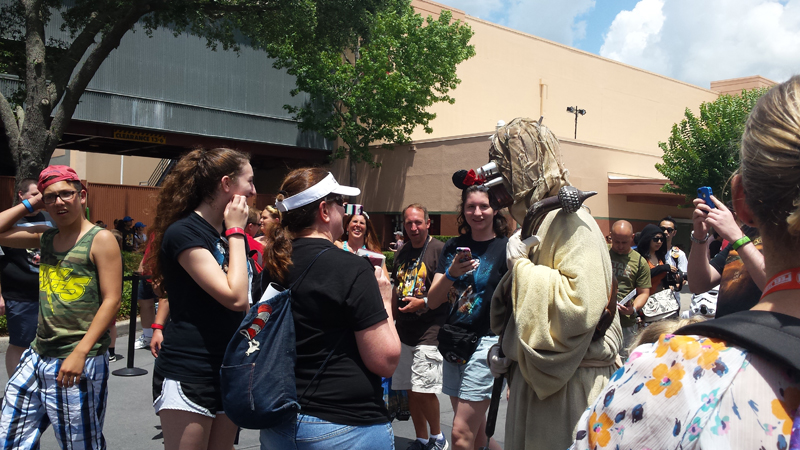
May 4th was Star Wars Day, a day of commemoration for one of the most popular science fiction franchises in the world. How and why Star Wars Day came about is as intriguing as the fictional universe it celebrates. Until recently, holidays seemed to be immutable, days steeped in tradition and history, but those very same elements often distanced them from personal experiences. Enter modern fandom and the internet, where the fiery passion of fans and the desire to celebrate their interests has led to the creation of a very modern holiday: Star Wars Day, May the 4th. The invention of Star Wars Day is reflective of the ability of popular culture to generate a shared experience that deeply impacts individual lives as readily as real world events. The success of Star Wars Day demonstrates how popular culture can become a participatory culture, where fans take an active role in producing culture instead of only acting as passive consumers.
The genesis of May the 4th becoming Star Wars Day and the de facto holiday for Star Wars fans arose out of simple wordplay rather than any connection to the franchise. Like in a Japanese Manzai comedy skit, if you say Star Wars’ signature phrase, “May the Force be with you,” quickly enough you get something close to, “May the Fourth be with you.” Close enough became good enough, as fans latched on to the date as a way to celebrate a franchise that has become an essential part of individual childhood (and lets be honest, adulthood) for many as well as a new, shared mythology. For even as geek culture has crashed into the mainstream within the past decade, opportunities to openly display love for pop culture have remained relatively scarce within everyday society. The opportunities to do so in unison with like-minded others are even more infrequent outside of the cloistered spaces of conventions or fan gatherings. May the 4th is only the most prominent of a new wave of fan created holidays, as First Contact Day from Star Trek or the anniversary of the Moon’s break from Earth’s orbit in Space:1999 also earn their share of Twitter posts and celebrations.

These holidays have gained traction in this modern age thanks to the internet and the rising strength of fandom, but their celebration speaks to more than simply flaunting geek credentials. The connective tissue behind these holidays is the mutual accessibility of pop culture experiences and the creation of a moment to celebrate that shared experience on personally determined terms. It is also a seeming repudiation of the increasingly corporate nature of holidays, which are all too often disconnected from the source material, to borrow pop culture terms. If you frequent social media, holiday backlash is a common occurrence. Holidays are frequently accused of having become subverted to other causes—crass consumerism being the most obvious culprit. Valentines’ Day is derided for selling cards and flowers, while Halloween and Thanksgiving endure Christmas creep as the most profitable of all holidays expands its season. Presidents’ Day equates to mattress sales. May the 4th, as with First Contact Day, remains firmly in the hands of the fans to this point, who are able to dictate how and why their invented holidays should be celebrated. As with any blank slate, without the constraints of tradition, fans are free to celebrate in the manner of their choosing, with the conviction their celebration is born out of personal desire and interest and not mandated by society.

For all the individualism inherent in Star Wars Day, the holiday also offers a connection to other persons that is both visceral and emotional. The spaces that define the distance between ourselves and the deeds of others are a vast gulf. The events and experiences of the past are distant and inaccessible to most people on a personal level. Unlike historical events, popular culture welcomes the fan into the experience, into a great moment of fictional time that can be played out on demand. Rarely do regular people individually shape the course of history, and when they it is often at a steep cost. While historians like E.P. Thompson and Howard Zinn may speak to the inherent nobility of people’s history, the monumental triumph that is the day to day existence of ordinary people, the grinding gears of daily life rarely make for the stuff of fictional legend. The great moments of popular culture are too often still the epic actions performed by great men and women imbued with glorious purpose. The success of Avengers: Age of Ultron and the entire Marvel Cinematic Universe exemplifies this concept, yet popular culture allows the “ordinary” fan to share in the moment, to take part in the experience on a personal level. Star Wars Day allows for that participatory act to be carried forward, out of the theater, to add to the collective experience in a new space, that of the day to day world. For researcher Henry Jenkins, the ability of fans to engage with popular culture is a key feature driving modern fandom.

Historian Paul A. Cohen characterized the way a 1898 uprising in China is remembered into three categories: event, experiences, and myth. His general idea is that any event is experienced by a a certain few, and then eventually becomes a mythologized form that is open to interpretation and use by others. Modern holidays do the same, rendering a moment into a constructed, mythologized form that may not reflect the event or original purpose. Today, popular culture and the global reach of technology has wrestled the paradigm into a new form. The events of popular culture history have become accessible experiences to millions, marked by midnight lines to buy the newest Halo game, the rush of playing a new World of Warcraft expansion as servers crash and digital history is made, and the shared thrill of sitting in a theater for the premiere of a generations’ touchstone cultural event. Popular culture has become an event that anyone can take part in, even removed far from the moment of inception. Parents show Star Wars to children while new fans can delve into the moment on DVD and take part in the experience as readily and to a degree as authentically as the young girl who saw the first film in a two screen cinema in 1977.
The collection and creation of Star Wars objects and adds to the construction of a shared experience, a necessity due to the fictional nature of the franchise. Author Dominic states postmodern popular culture is a culture sans frontières, a culture without borders, standing outside of history. Star Wars, like most fictional works, is bereft of the material objects that come from real world events, so fans must find their own. Given modern complaints about the commercial nature of traditional holidays, Star Wars fandom is perversely built upon spending money for action figures, replica lightsabers, or homemade armor. In a profitable flash of prescience, George Lucas kept the rights to Star Wars toys in his initial negotiations with Fox, a move that has netted him a fortune. Like a knights’ sword on the mantel or a grandfathers’ pocket watch, Star Wars generates a steady stream of objects that carry with them meaning and import. A lightsaber prop on a desk evokes the climactic duel between Darth Vader and Luke Skywalker as a personal memory for the owner through the lens of participatory culture. The combination of personal experience and tangible possessions is a potent one, easing the fiction of Star Wars into the real world, and spurring the need to celebrate the shared fictional triumphs and tragedies. So for the Star Wars fans among us, May the 4th be with you. Unless of course, you empathize more with the Empire and its promise of Dark Side cookies. In that case, beware May the Fifth, or Dark Side inclined fans prefer, May the Sith.
References
May the Fourth on Starwars.com
May The Fourth Be With You: ‘Star Wars’ Fans Celebrate A Faraway Galaxy
Star Wars Day: May the 4th Party Tips – Food
Star Wars Day Attack Ad: Say No to May the 4th
Kristin M. Barton and Jonathan Malcolm Lampley, eds. Fan CULTure: Essays on Participatory Fandom in the 21st Century. Jefferson: McFarland & Company, 2014.
Paul Cohen. History in Three Keys: The Boxers as Event, Experience, and Myth. New York: Columbia University Press, 1997.
Henry Jenkins. Convergence Culture: Where Old and New Media Collide. New York: New York University Press, 2008.
Henry Jenkins. Textual Poachers: Television Fans and Participatory Culture. New York: Routledge, 2013
Dominic Strinati. Introduction to Theories of Popular Culture. New York: Routledge, 1995.



